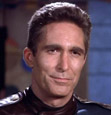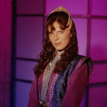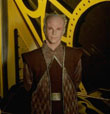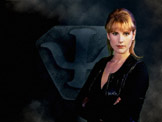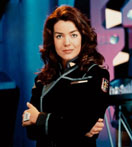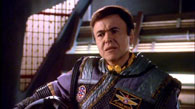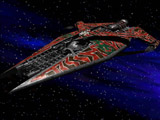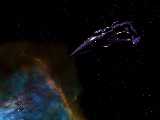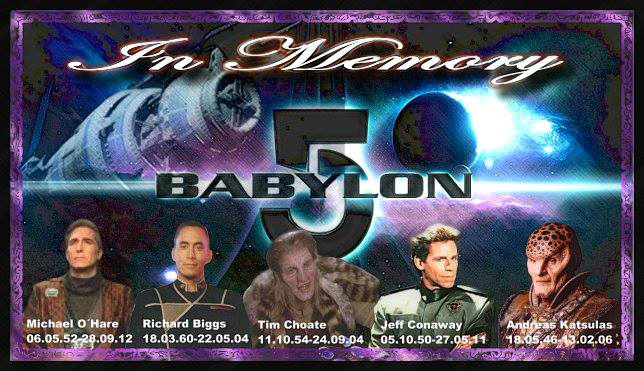

| Most
people either hate sci-fi or they are hard core fans. For me I love
it when it's done well but can't watch if it's just for the sake of
alien invasions and special effects. The sci-fi format can be great
for exaggerating situations or social issues that entice the viewer
to think about similar issues in our own history. Rod Serling, Buck
Houghton and the other creators of The Twilight Zone were
pioneers at this and were able to make powerful statements about
war, racism and politics that would have otherwise been censored
from TV in that sanitized period of post-ww2 utopian escapism we
were forced to indulge in after that awful war. Things are much
different today, and when sci-fi or other fantasy films try to make
social statements now it seems transparent and pointless, so these
stories have gone back to telling simple tales of great adventures
full of action, wonder and classic good vs evil. Next Generation acheived and
surpassed everything that was lacking in the original series, and
it's successors DS9, Voyager and Enterprise tried to carry on that
tradition but, for the most part, simply ran out of new ideas.
Still great stuff but nothing revolutionary, although the DS9 "Dominion" and Enterprise "Xindi" arcs were outstanding. It was during the DS9
period that Babylon 5 was released as an independant series
from Warner Brothers/Action Pack Network, and went pretty much unnoticed throughout
it's first season and barely made it back for a second, mainly
because that first season was a little slow and clumsy as the
characters developed and all the premices were put in place. If you
didn't watch every week it was hard to warm up to, and the
"stand-alone" episodes didn't stand alone very well. If you made it
to season 2, however, there was no turning back. I got hooked on B5 back when the show was originally run in syndication at 11:30 every Saturday night. It was at the end of season 3 that our local station dropped the series and replaced it with Baywatch reruns. My son, being much younger then and certainly not interested in anything so dark and depressing, could not understand what I saw in the show or why I was bummed when it was axed. Like a lot of people he kinda compared it to Next Generation , which is like comparing Gulliver's Travels to Lord of the Rings . However, when it was brought back to life by TNT we watched it from the beginning and he became more avid a fan than myself. We're both going to miss it, and the "Crusade" series that followed simply wasn't enough story arc to make it addicting. Unfortunately, too, the music made it difficult for me to sit through long enough to warm up to a new set of characters. After the final B5 "Sleeping in light" episode it's hard to imagine anything coming close to that kind of overwhelming bittersweetness. That final sequence of events and Ivanova's speech enhanced by Christopher Franke's piece still gives me goosebumps. I would have been content to say goodbye there, even with all the loose ends left unresolved (from previous episodes we all know what happens anyway). Since the show's demise my son has collected all 5 seasons on DVD, and as they were released we watched them all again, and they were nearly as much fun the second time as they were the first. Truly a unique melodramatic saga put together as a 5 year story that was "sci-fi" only in the sense that it took place in the future. Oh yeah, it had lots of aliens and special effects too. Anyway, here are a few pics and links, and a whole lot of info to fill out this page. And for tons of info on new and classic TV check out the Links to other cool shows . |
(NOTE: These thumbnails are all
at 80% reduction and therefore relative to each other in actual
size)
BABYLON 5 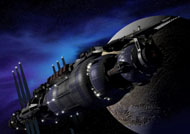 B5 CAST
B5 CAST 
|
Synopsis (spoiler) The series takes its name from the Babylon 5 space station, located in the Epsilon Eridani star system, at the fifth Lagrangian point between the fictional planet Epsilon III and its moon. Babylon 5 is an O'Neill cylinder five miles long and a half-mile to a mile in diameter. Living areas accommodate the various alien species, providing differing atmospheres and gravities. Human visitors to the alien sectors are shown using breathing equipment and other measures to tolerate the conditions. The five seasons of the series each correspond to one fictional sequential year in the period 2258:2262. Each season shares its name with an episode that is central to that season's plot. As the series starts, the Babylon 5 station is welcoming ambassadors from various races in the galaxy. Earth has just barely survived an accidental war with the much more powerful Minbari, who, despite their superior technology, mysteriously surrendered at the brink of the destruction of the human race during the Battle of the Line. Season 1 : Year 2258 Signs and Portents During 2258, Commander Jeffrey Sinclair is in charge of the station. Much of the story revolves around his gradual discovery that it was his capture by the Minbari at the Battle of the Line which ended the war against Earth. Upon capturing Sinclair, the Minbari came to believe that Valen, a great Minbari leader and hero of the last Minbari-Shadow war, had been reincarnated as the Commander. Concluding that others of their species had been, and were continuing to be reborn as humans, and in obedience to the edict that Minbari do not kill one another, lest they harm the soul, they stopped the war just as Earth's final defenses were on the verge of collapse. Meanwhile, tensions between the Centauri Republic, which is an empire in decline, and the Narn Regime, a former dominion which rebelled and gained freedom, are increasing. Ambassador G'Kar of the Narn wishes for his people to strike back at the Centauri for what they did, and Ambassador Londo Mollari of the Centauri wishes for his people to become again the great empire they once were. As part of these struggles, Mollari makes a deal with a mysterious ally to strike back at the Narn, further heightening tensions. It is gradually revealed that Ambassador Delenn is a member of the mysterious and powerful Grey Council, the ruling body of the Minbari. Towards the end of 2258, she begins the transformation into a Minbari-human hybrid, ostensibly to build a bridge between the humans and Minbari. The year ends with the death of Earth Alliance president Luis Santiago. The death is officially ruled an accident, but some members of the military, including the staff of Babylon 5, believe it to be an assassination. Season 2 : Year 2259 The Coming of Shadows At the beginning of 2259, Captain John Sheridan replaces Sinclair as the military governor of the station after Sinclair is reassigned as ambassador to Minbar. He and the command staff gradually learn that the assassination of President Santiago was arranged by his then-Vice President, Morgan Clark, who has now become president. Conflict develops between the Babylon 5 command staff and the Psi Corps, an increasingly autocratic organization which oversees and controls the lives of human telepaths. The Shadows, an ancient and extremely powerful race who have recently emerged from hibernation, are revealed to be the cause of a variety of mysterious and disturbing events, including the attack on the Narn outpost at the end of 2258. Centauri Ambassador Londo Mollari unknowingly enlists their aid through his association with their mysterious human representative Mr. Morden in the ongoing conflict with the Narn. The elderly and ailing Centauri emperor, long an advocate of reconciliation with the Narn, unfortunately has insufficient control to prevent others from instigating war against the Narn Regime. When the emperor dies suddenly during a peace mission to Babylon 5, a number of conspirators, including Ambassador Londo Mollari and Lord Refa, take control of the Centauri government by assassinating their opponents and placing the late emperor's unstable nephew on the throne. Their first act is to start open aggression against the Narn. After a full-scale war breaks out, the Centauri with the help of the Shadows through Londo eventually conquer Narn in a brutal attack involving mass drivers, outlawed weapons of mass destruction. Towards the end of the year, the Clark administration begins to show increasingly totalitarian characteristics, clamping down on dissent and restricting freedom of speech. The Vorlons are revealed to be the basis of legends about angels on various worlds, including Earth, and are the ancient enemies of the Shadows. They enlist the aid of Sheridan and the Babylon 5 command staff in the struggle against the Shadows. Season 3 : Year 2260 Point of No Return The Psi Corps and President Clark, whose government has discovered Shadow vessels buried in Earth's solar system, begin to harness the vessels' advanced technology. The Clark administration continues to become increasingly xenophobic and totalitarian, and gradually develops an Orwellian government style, including an organization called Night Watch which targets citizens who hold views contrary to those of Clark's regime. Sheridan and Delenn's "conspiracy of light" works to uncover clues about how to defeat the Shadows. During a mission near Ganymede, one of the moons of Jupiter, their ship is seen by an Earth Alliance vessel, but not recognized. Though they escape and no shots were fired in the encounter, President Clark uses it as an excuse to declare martial law. This triggers a war of independence on Mars, which had long had a strained political relationship with Earth. Babylon 5 attempts to avoid conflict with Earth, but in response to civilian bombings on Mars, concerns with Night Watch, and illegal orders meant to oppress their populations, they choose to declare independence from Earth, along with several other outlying Earth Alliance colonies. In response, the Earth Alliance attempts to retake Babylon 5 by force, but with the aid of the Minbari, who have allied with the station against the growing Shadow threat, the attack is repelled. Becoming concerned over the Shadows' growing influence among his people, Centauri ambassador Londo Mollari attempts to sever ties with them. Mr. Morden, the Shadows' human representative, tricks him into restoring the partnership by engineering the murder of Mollari's mistress while putting the blame on a rival Centauri House. Open warfare breaks out between the Shadows and the alliance led by Babylon 5 and the Minbari. It is learned that genetic manipulation by the Vorlons is the source of human telepathy, as it is later discovered that Shadow ships are vulnerable to telepathic attacks. Displeased at the Vorlons' lack of direct action against the Shadows, Captain John Sheridan browbeats Vorlon ambassador Kosh Naranek into launching an attack against their mutual enemy. Kosh's deeds lead to his subsequent assassination by the Shadows. Former station commander Jeffrey Sinclair returns to Babylon 5 to enlist the aid of Captain Sheridan, Delenn, Ivanova and Marcus in stealing the Babylon 4 space station and sending it 1,000 years back in time to use it as a base of operations against the Shadows in the previous Minbari-Shadow war. Undergoing the same transformation as Delenn at the end of Season 1, Sinclair transforms into a Minbari and is subsequently revealed to be the actual Valen of Minbari legend, rather than simply a reincarnation. Meanwhile, as a result of the unstable time travel, Sheridan sees a vision of the downfall of Centauri Prime when it is attacked by Shadow allies after the Shadow war, and he becomes determined to prevent that future. Sheridan and Delenn begin a romantic relationship, but their lives and the war are interrupted by the sudden reappearance of Sheridan's wife, who was presumed dead after taking part in an archaeological expedition to Z'ha'dum years prior. She tells Sheridan that the Shadows are not evil, hoping to bring him back with her and recruit him to their cause. He soon realizes that her mind has been tampered with and corrupted by the Shadows, but accepts her offer to visit Z'ha'dum because he hopes it will save the galaxy sooner and prevent the downfall of Centauri Prime. He takes with him a pair of nuclear warheads, which he uses to destroy their largest city, and is last seen jumping into a miles-deep pit to escape the explosion. Shadow vessels appear at the station, but disappear after Sheridan's attack. However, after they leave, station personnel realize that Garibaldi, who left in a fighter to defend against the vessels, never returned. Season 4 : Year 2261 No Surrender, No Retreat In 2261, the Vorlons join the Shadow War, but their tactics become a concern for the alliance when the Vorlons begin destroying entire planets which they deem to have been "influenced" by the Shadows. Disturbed by this turn of events, Babylon 5 recruits several other powerful and ancient races (the First Ones) to their cause, against both the Shadows and the Vorlons. Captain John Sheridan returns to the station after escaping from Z'ha'dum and reunites the galaxy against the Shadows, but at a price: barring illness or injury, he has only 20 years left to live. He is accompanied by a mysterious alien named Lorien who claims to be the first sentient being in the galaxy, and who breathed life into Sheridan at Z'ha'dum. Once Sheridan returns, he and Delenn formalize their relationship and begin planning to marry, although most of their plans are put on hold due to the ongoing war. Hours before Sheridan's return, Garibaldi is rescued and returned to the station, in rather dubious circumstances. Over the course of the next several months, he becomes markedly more paranoid and suspicious of other alien races and of Sheridan than he was before, causing worry among his friends and colleagues. After the Shadows are defeated Garibaldi leaves his post as security chief and works on his own as a "provider of information". He begins working for one William Edgars, a Mars tycoon, who is married to Garibaldi's former love. While he works ever closer with Edgars, he becomes increasingly aggressive toward Sheridan and eventually leaves Babylon 5. Centauri Emperor Cartagia forges a relationship with the Shadows. With the reluctant help of his enemy G'Kar, Londo Mollari engineers the assassination of Cartagia and repudiates his agreement with the Shadows. In exchange for G'Kar's help, Londo frees the Narn from Centauri occupation. Londo afterwards kills Mr. Morden and destroys the Shadow vessels based on the Centauri homeworld, in an attempt to save his planet from destruction by the Vorlons. Aided by the other ancient races, and several younger ones, Sheridan lures both the Vorlons and the Shadows into an immense battle, during which the Vorlons and Shadows reveal that they have been left as guardians of the younger races, but due to philosophical differences, ended up using them as pawns in their endless proxy wars throughout the ages. The younger races reject their continued interference, and the Vorlons and Shadows, along with the remaining First Ones, agree to depart the galaxy in order to allow the younger races to find their own way. Minbar is gripped by a brief civil war between the Warrior and Religious castes. Delenn secretly meets with Neroon of the Warrior caste and convinces him that neither side can be allowed to win. She tells him that she will undergo a ritual wherein she will be willing to sacrifice herself, but will stop the ritual before she actually dies. When Neroon sees that she actually intends to go through the entire ritual, he rescues her and sacrifices himself instead, declaring that, although he was born Warrior caste, in his heart he is Religious caste. As part of the ongoing conflict between Earth and Babylon 5, Garibaldi eventually betrays Sheridan and arranges his capture in order to gain Edgars' trust and learn his plans. Garibaldi later learns that Edgars created a virus that is dangerous only to telepaths. It is then revealed that after Garibaldi was captured the previous year, he was taken to the Psi Corps and re-programmed by Bester to provide information to him at the right time. Bester releases Garibaldi of his programming, and allows him to remember everything he has done since being kidnapped. Edgars is killed and his wife disappears, but is reunited with Garibaldi after the end of the war. Sheridan is tortured and interrogated by those who hope to break him and turn him into a propaganda tool for Earth's totalitarian government. Fortunately, Garibaldi is able to help free Sheridan and return him to the campaign to free Earth. An alliance led by Babylon 5 frees Earth from totalitarian rule by president Clark in a short but bloody war. This culminates in Clark's suicide and the restoration of democratic government due to Susanna Luchenko (played by Beata Pozniak) becoming president of Earth's Alliance. Mars is granted full independence, and Sheridan agrees to resign his commission. The League of Non-Aligned Worlds is dissolved and reformed into the Interstellar Alliance, with Sheridan elected as its first president and continuing his command of the Rangers, who are to act as a galactic equivalent of United Nations peacekeepers. Londo and G'Kar enter an uneasy alliance to help both their races as well as Sheridan in forming the Interstellar Alliance. During the Battle Ivanova is critically injured, promised only a few days to live. Marcus, who had fallen in love with Ivanova, finds the same alien healing device used to revive Garibaldi at the beginning of the second season, and uses it to transfer almost all of his life energy into Ivanova, causing her to live. This causes her immense emotional anguish, and she chooses to leave Babylon 5. Marcus is placed into indefinite cryonic suspension at her request, pending resuscitation technology. Sheridan and Delenn complete their marriage ceremony while en route to Babylon 5, where they will head the Interstellar Alliance for the next year. In the season finale, the events of 100, 500, 1000, and one million years into the future are shown, depicting Babylon 5's lasting influence throughout history. Among the events shown are the political aftermath of the 2261 civil war, a subsequent nuclear war on Earth involving a new totalitarian government in the year AD 2762, the resulting fall of Earth into a pre-industrial society, the loss and restoration of humanity's knowledge of space travel, and the final evolution of mankind into energy beings similar to the Vorlons, after which Earth's sun goes nova. Season 5 : Year 2262 and beyond The Wheel of Fire In 2262, Earthforce Captain Elizabeth Lochley is appointed to command Babylon 5, which is now also the headquarters of the Interstellar Alliance. The station grows in its role as a sanctuary for rogue telepaths running from the Psi Corps, resulting in conflict. G'Kar, former Narn ambassador to Babylon 5, becomes unwillingly a spiritual icon after a book that he wrote while incarcerated during the Narn-Centauri War is published without his knowledge. The Drakh, former allies of the Shadows who remained in the galaxy, take control of Regent Virini on Centauri Prime through a parasitic creature called a Keeper, then incite a war between the Centauri and the Interstellar Alliance, in order to isolate the Centauri from the Alliance and gain a malleable homeworld for themselves. Centauri Prime is devastated by Narn and Drazi warships and Londo Mollari becomes emperor, then ends the war. However, the Drakh blackmail him into accepting a Drakh Keeper, under threat of the complete nuclear destruction of the planet. Vir Cotto, Mollari's loyal and more moral aide, becomes ambassador to Babylon 5 in his stead. G'Kar also leaves Babylon 5 to escape his unwanted fame and explore the rim. Sheridan and Delenn move to a city on Minbar, where the new headquarters of the Interstellar Alliance are located, while celebrating their first year of marriage and the upcoming birth of their son, and mourning the loss of dear friendships. Garibaldi marries and settles down on Mars, where he and his wife share ownership of a prominent pharmaceutical company. Most other main characters, including Stephen Franklin and Lyta Alexander, leave Babylon 5 as well. As shown in flash-forwards earlier in the series, the next several years include the reign of Londo Mollari as Centauri Emperor. Sixteen years later, Londo sacrifices his life to rescue Sheridan and Delenn from the Drakh, in the hope that they in turn can save Centauri Prime. To prevent the Drakh from discovering his ruse, he asks G'Kar, now an old friend, to kill him, but Londo's Keeper wakes up and forces him to kill G'Kar in return. They die at each other's throats, in accordance with Londo's vision many decades earlier, and Vir Cotto succeeds him as emperor, free of Drakh influence. Three years after Londo's death, Sheridan himself is on the verge of death and takes one last opportunity to gather his old friends together. Shortly after his farewell party, Sheridan says goodbye to Delenn, though in Minbari fashion they use the word "goodnight" to signify their hope of an eventual reunion. Sheridan then takes a final trip to the obsolete Babylon 5 station before its decommissioning. He returns to the site of the final battle between the Vorlons and the Shadows and apparently dies, or is instead claimed by The First One Lorien, who joins Sheridan in his final moments. Babylon 5 station is destroyed in a demolition shortly after Sheridan's departure, its existence no longer necessary as the Alliance has taken over its diplomatic purposes and other trading routes have been established. This final episode features a cameo by Straczynski as the technician who switches off the lights before Babylon 5 is demolished. The final epilogue after the epic destruction of Babylon 5 is delivered by Ivanova, foretelling that the few remaining survivors of this tragic and triumphant story lived out their days in accordance to the destinies set for them long before. Delenn outlived them all but remained alone after Sheridan's death, and Ivanova herself finally found peace and took Sheridan's role as leader of the Rangers. thanks to Wikipedia for much of this synopsis. jw. |
|
Further Wiki excerpts: Symbolism and Relevance Order vs. chaos: The clash between authoritarianism and free will, and the people caught in between, plays an important role in Babylon 5. The conflict between two unimaginably powerful older races, the Vorlons and the Shadows, is represented as a battle between two competing ideologies, each seeking to turn the younger races to their beliefs. The Vorlons represent an authoritarian philosophy: you will do what we tell you to, because we tell you to do it. The Vorlon question, "Who are you?" focuses on identity as a catalyst for shaping personal goals; the intention is not to solicit a "correct" answer, but to "tear down the artifices we construct around ourselves until we're left facing ourselves, not our roles." The Shadows represent another authoritarian philosophy cloaked in a disguise of evolution through fire, of sowing the seeds of conflict in order to engender progress. The question the Shadows ask is "What do you want?" In contrast to the Vorlons, they place personal desire and motivation first, using it to shape identity, encouraging conflict between groups who choose to serve their own glory or profit, stimulating progress through ambition. The climax of this conflict comes with the younger races' exposing of the Vorlons' and the Shadows' "true faces" and the rejection of both philosophies, heralding the dawn of a new age without their interference. This notion is also echoed in the portrayal of the civil war between the human colonies and Earth. Deliberately dealing in historical and political metaphor, with particular emphasis upon McCarthyism and Nazi Germany, the Earth Alliance becomes increasingly authoritarian, eventually sliding into a dictatorship. The show examines the impositions on civil liberties under the pretext of greater defense against outside threats which aid its rise, and the self-delusion of a populace which believes its moral superiority will never allow a dictatorship to come to power, until it is too late. The successful rebellion led by the Babylon 5 station results in the restoration of a democratic government, and true autonomy for Mars and the colonies. War and peace: The Babylon 5 universe deals with numerous armed conflicts which range on an interstellar scale. The story begins in the aftermath of a war which brought the human race to the brink of extinction, caused by a misunderstanding during a first contact situation. The Babylon 5 station is subsequently built in order to foster peace through diplomacy, described as the "last, best hope for peace" in the opening credits monologue during its first three seasons. Wars between separate alien civilizations are featured. The conflict between the Narn and the Centauri is followed from its beginnings as a minor territorial dispute amplified by historical animosity, through to its end, in which weapons of mass destruction are employed to subjugate and enslave an entire planet. The war is an attempt to portray a more sobering kind of conflict than usually seen on science fiction television. Inspired by real-world moments when "the world held its breath", the emotional core of these conflicts was the disbelief that they could have occurred at all, and the desperation of wanting to bring it to an end. By the start of the third season, the opening monologue had changed to say that the hope for peace had "failed" and the Babylon 5 station had become the "last, best hope for victory", indicating that while peace is a laudable accomplishment, it can also mean a capitulation to an enemy intent on committing horrendous acts, and that "peace is a byproduct of victory against those who do not want peace." The Shadow War also features prominently in the show, during which an advanced alien species attempts to "kick over ant hills" in order to promote technological and cultural advancement. The gradual discovery of the scheme and the rebellion against it, serve as the backdrop to the first three seasons, but also as a metaphor for the war within ourselves. The concurrent limiting of civil liberties and Earth's descent into a dictatorship are "shadow wars" of their own. In ending the Shadow War before the conclusion of the series, the show was able to more fully explore its aftermath, and it is this "war at home" which forms the bulk of the remaining two seasons. The struggle for independence between Mars and Earth culminates with a civil war between the human colonies (led by the Babylon 5 station) and the home planet. Choosing Mars as both the spark for the civil war, and the staging ground for its dramatic conclusion, enabled the viewer to understand the conflict more fully than had it involved an anonymous colony orbiting a distant star. These conflicts, and the reasons behind them, were inspired by our own history as if to remind us that those who do not remember history are doomed to repeat it. The post-war landscape has its roots in reconstruction. The attempt to resolve issues after the conflict has ended, and this struggle for survival in a changed world illustrates that the end of these wars is not an end to war itself. Events shown hundreds of years into the show's future tell of wars which will once again bring the human race to the edge of annihilation, demonstrating that mankind will not change, and the best that can be hoped for after it falls is that it climbs a little higher each time, teaching those who follow. Religion: Many of Earth's contemporary religions are shown to still exist, with the main human characters often having religious convictions, including Roman Catholicism, including the Jesuits, Judaism and the fictional Foundationism, which was created after first contact with alien races. Alien beliefs in the show range from the Centauri's Bacchanalian-influenced religions, of which there are up to seventy different denominations, to the more pantheistic, as with the Narn and Minbari religions. In the show's third season, a community of Cistercian monks takes up residence on the Babylon 5 station, in order to learn what other races call God, and to come to a better understanding of the different religions through study at close quarters. References to both human and alien religion is often subtle and brief, but can also form the main theme of an episode. The first season episode "The Parliament of Dreams" is a conventional "showcase" for religion, in which each species on the Babylon 5 station has an opportunity to demonstrate its beliefs, while "Passing Through Gethsemane" focuses on a specific position of Roman Catholic beliefs, as well as concepts of justice, vengeance and biblical forgiveness. Other treatments have been more contentious, such as "Believers", in which alien parents would rather see their son die than undergo a life-saving operation because their religious beliefs forbid it. When religion is an integral part of an episode, various characters can be used to express differing view points. Such as in "Soul Hunter", where the concept of an immortal soul is touched upon, and whether after death it is destroyed, reincarnated or simply does not exist. The character arguing the latter, Doctor Stephen Franklin, often appears in the more spiritual storylines as his scientific rationality is used to create dramatic conflict. The origins of religion come into question also, hinting at the possibility that many ancient religions may have been based less on superstition and more on the accidental exposure of an advanced being to a primitive race (as in STNG's "Who Watches the Watchers" episode that deals with cultral contamination), or the more intentional exposure of the Vorlons to these races, made apparent when Kosh left his encounter suit and was recognized by everyone in a different form according to their spiritual background. Londo saw nothing, which was a sad revelation as to how empty his heart and soul had become. Sacrifice: A major theme in Babylon 5 is the concept of sacrifice for a greater cause. Kosh sacrifices his life for a first victory against the Shadows. John Sheridan is ready to die at Z'ha'dum. Delenn is ready to die in the starfire wheel to restore Minbari society. Marcus Cole gives his life to save Susan Ivanova. Londo Mollari willingly accepts complete enslavement by a Drakh keeper to save the Centauri from annihilation. Many minor characters also willingly give their lives such as the crew of Drazi or Minbari ships in the final confrontation with the Shadows to save the Army of Light's leaders, or the Centauri who stayed at the island of Selini to allow the destruction of the Shadow warships, and so on. Captain Ericsson of White Star 14 is knowingly given a false report detailing the opening of an Army of Light base on Coriana VI at approximately the same time as the Vorlons' arrival. It is a suicide mission; he is to intrude into Shadow space and engage the Shadows as if on a real raid, so that when the Shadows destroyed his ship and discovered the file, they would be convinced the report is true and rush to Coriana. By forcing a direct confrontation, Sheridan believes he can finally get the Vorlons and Shadows into a position where he can resolve the war. Ericsson grimly accepts the mission and gives a final Anla'Shok salute to Delenn before signing off. "Some of us must be sacrificed if all are to be saved." is the spiritual epiphany experienced by G'Kar. This reflects the Vorlon philosophy in contrast to the self-interest philosophy of the Shadows. Dreams and visions: The subliminal and subconscious play a very significant role in the Babylon 5 universe. Every major character experiences, on at least one occasion, some altered state of consciousness in which he or she receives some sort of important mental message. This could either be one that further fleshes out the character for the benefit of the viewer, or one of transcendental and transpersonal nature that anticipates important further developments in the storyline. Some of these signs and portents resemble lucid dreams, but many are quite bizarre and "dreamlike", frequently in a metaphoric context, such as Sheridan's dream of his father at the time of Kosh's death. Addiction: Substance abuse and its impact on human personalities also plays a significant role in the Babylon 5 storyline. The station's security chief, Michael Garibaldi, is a textbook relapsing-remitting alcoholic of the binge drinking type; he practices complete abstinence from alcohol throughout most of the series (with one notable exception) until the middle of season five. He only recovers physically and socially and breaks the cycle at the end of the season. His eventual replacement as Chief of Security, Zack Allan, was given a second chance by Garibaldi after overcoming his own addiction to an unspecified drug. Dr. Stephen Franklin develops an (initially unrecognized) addiction to injectable stimulant drugs while trying to cope with the chronic stress and work overload in Medlab (stemming from the Markab extinction), and wanders off to the homeless and deprived in Brown Sector, where he suffers through a severe withdrawal. Executive Officer Susan Ivanova mentions that her father became an alcoholic after her mother had committed suicide after having been drugged by the authorities over a number of years. Captain Elizabeth Lochley tells Garibaldi that her father was an alcoholic and that she is a recovering alcoholic herself. Among the aliens, Londo Mollari is a heavy abuser of alcohol, although in Centauri culture sobriety, as opposed to drunkenness, is considered a vice. Numerous other references to substance abuse and drug dealing are scattered throughout the storyline, including Dust, a white powder with a black-market presence comparable to cocaine or meth. "Dust" turns out to be a "designer drug" developed by Psi Corps and placed into the black market as an experiment to see if psychic abilities could be brought out in "mundanes" (non-telepaths). Summary: Babylon 5 was called the first "sci-fi soap opera" that inspired Battlestar Gallactica, Lost, and other high drama sci-fi series that used addicting story arcs to keep viewers in anticipation. More so, however, B5 was a parallel of our own struggles brought to life by complex characters doing all the wrong things for all the right reasons. It was a story of failure, triumph, sacrifice and redemption. It was one of the few, if not the only, sci-fi love stories that actually worked. It was also somewhat of a puzzle to be solved, by both the characters and viewer, through defining moments and bittersweet revelations. It was brilliantly written and brought to life by a cast that delivered great dramatic performances along with a dry wit and sometimes comedic banter that made their larger-than-life characters genuine, believable and relatable. JMS is still moving forward with the script for a Babylon 5 big-screen movie. As of this writing April 2015, production is slated to start in 2016. jw. |
|
• SLEEPING IN LIGHT (MP3 audio / 1.52 MB) • B5 ENCYCLOPEDIA • JERRY DOYLE - INDEPENDENT CONSERVATIVE • LINKS TO OTHER COOL SHOWS |
